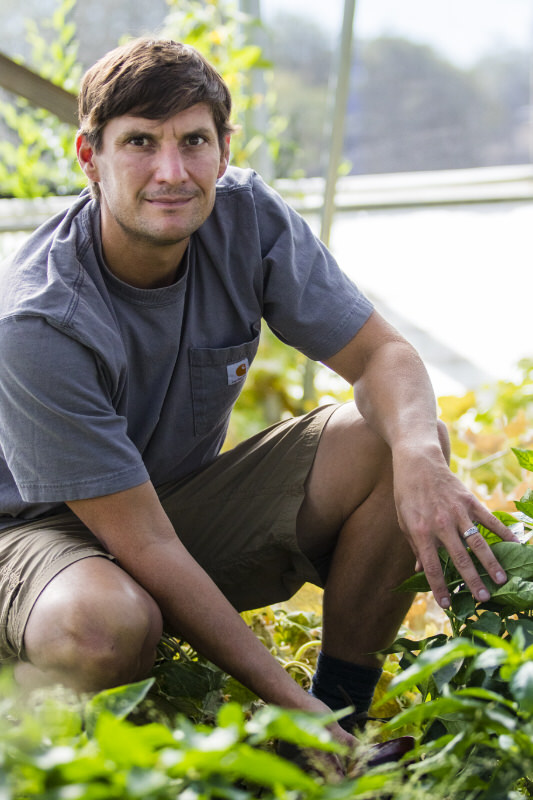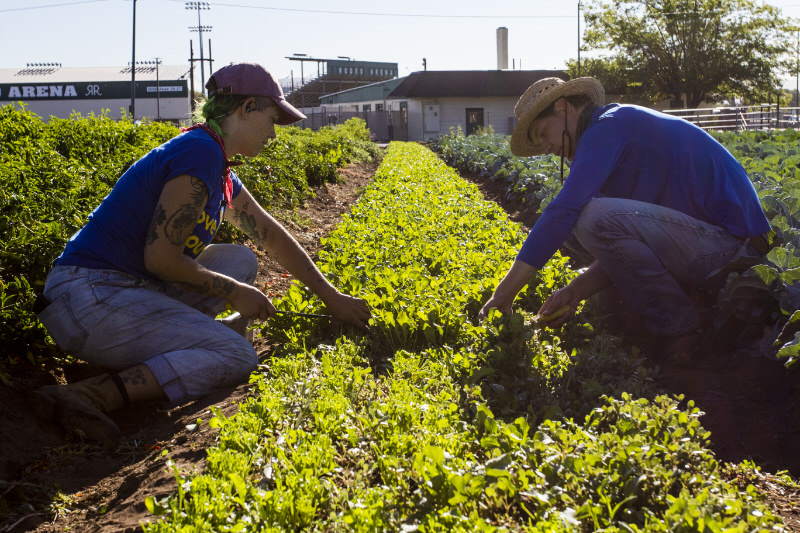Desert Farming Initiative primarily benefits students and small-scale farmers, but backyard gardeners can learn from the program’s years of high-desert research.
Tucked into an unlikely urban area between I-80 and the Reno Livestock Events Center is a surprisingly fertile land. Romaine lettuce, kale, basil, tomatoes, eggplant, potatoes, and other root crops flourish in the summer fields, and cilantro and spinach thrive in winter polytunnels.
However, this is not your typical farm where you can drop in to pick up plants or buy fresh vegetables. This agronomic arena is focused on education, demonstration, and research projects, but if you are quick on the draw, you can benefit from this multifaceted program.
Desert Farming Initiative is a certified organic farm and a special program within the College of Agriculture, Biotechnology & Natural Resources at the University of Nevada, Reno. Established in 2014, DFI’s employees, students, interns, volunteers, and AmeriCorps members grow about 100 different varieties of produce. The program’s seven acres include three acres of vegetables, eight hoop houses, an experimental vineyard, an apple orchard, a raspberry patch, and an herb garden.
“We’re not really focused on gardening,” says Charles Schembre, program director for DFI. “But everything that we’re doing here can apply to the gardener, so we do have a lot of interest from the general gardening community. We’re growing food and supporting food systems, so home gardeners can learn about what we’re growing, the varieties, the techniques, and the timing.”

The program’s goals are to support the small-scale farmer as well as all agriculture within the state. DFI offers technical support on the Food Safety Modernization Act for larger farms, sells produce to local restaurants and food hubs, donates to local food banks, and runs a farm share for UNR students and faculty. DFI’s farmers’ market booth and university farm stand (run by students) are two of the venues where the general public can access DFI’s multitude of organic crops.
“A lot of people come to our farm stand, and they don’t believe that what we are selling is actually grown here,” Schembre says. “We want locals to know that these vegetables can be grown here in this climate. While we want to focus on education and research, we do have a passion for getting our food out there.”
Off To a Good Start
Those involved with DFI also directly bring produce to your dinner plate through its seed-propagation service. The program produces more than 100,000 organic vegetable plant starts for farmers in the region. Farmers can order custom flats of plants for $25 per flat. This cuts out the shipping costs for flats that normally come from California. Schembre says DFI’s most popular starts are carrots because they normally have to be direct seeded and are slow growing. He added that farmers are very interested in DFI’s techniques for growing other crops, but the relationship is beneficial for both parties.
“We also learn from the farmers since some of them are having great success with certain vegetables they are growing,” Schembre says. “We will sometimes take what they’re growing and grow it here at our farm. It’s certainly a nice partnership.”
DFI managers periodically hold workshops and have volunteer opportunities through a work/trade program. DFI’s social media accounts include information on the program’s latest research, projects, and sales, and the DFI team soon plans on publishing a detailed planting guide for Northern Nevada.
The spring seedling sale at the Great Basin Community Food Co-op in Reno is probably your best bet for snagging your own DFI plant starts. Schembre says there has been tremendous interest in the quality of its plants, and people want to know DRI’s secrets. There really aren’t any. Its team eschews heated greenhouses and hydroponics and concentrates on growing within the Northern Nevada growing season.
“We are completely focused on the sun and the soil and what we believe is the true future of sustainability and the future of food production,” Schembre says. “For us, it’s more about precision and timing and reducing our input as much as possible.”
For details, visit Naes.unr.edu/dfi.
Christina Nellemann is keeping a close eye on DFI’s Instagram page for its next seedling sale.


